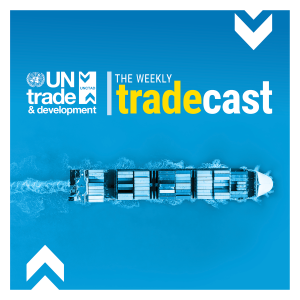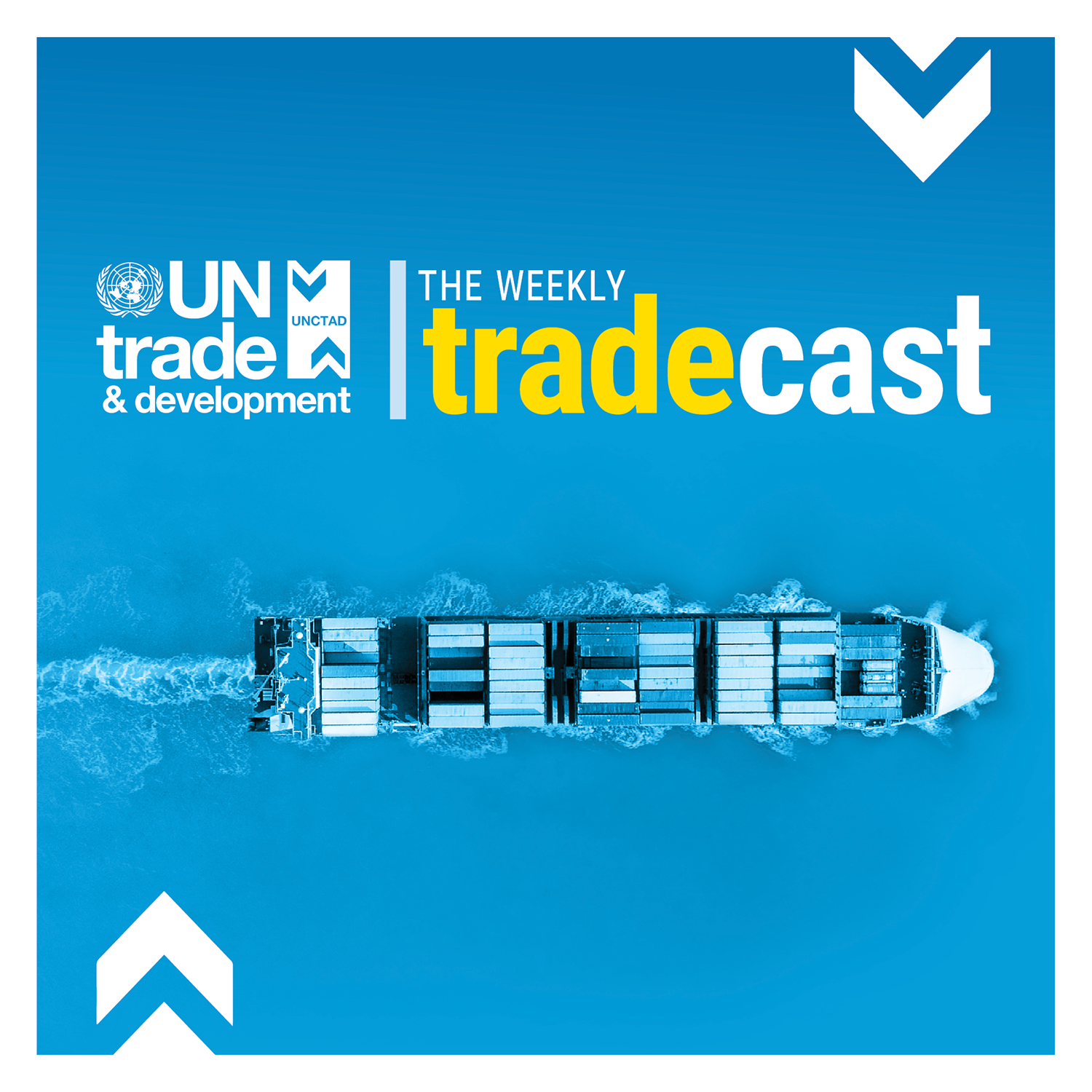Episodes
Episodes



Thursday Sep 19, 2024
113. UN Summit of the Future: How to build a better world
Thursday Sep 19, 2024
Thursday Sep 19, 2024
The Weekly Tradecast looks at the UN’s Summit of the Future and how any hopes for sustainable and inclusive development depend on us making fundamental changes in how we think and act.
Since 1964, when UN Trade and Development was created, the world has seen huge transformations of economies, technologies and societies. To meet our new realities, world leaders at this week’s Summit of the Future will be shaping how we recover from multiple crises now and create greener, more inclusive progress for generations to come.
At the summit – an initiative by UN Secretary General António Guterres – leaders are expected to agree on new measures and reforms covering the multilateral system, climate change, the digital world, the Sustainable Development Goals and more.
In the face of crises and complexities, listen to the voices of eminent economists, young people, the private sector and UN Trade and Development Secretary General Rebeca Grynspan on how we can work collectively to build a better world.



Thursday Sep 12, 2024
112. Cost of war: Palestinian economy will need decades to recover and rebuild
Thursday Sep 12, 2024
Thursday Sep 12, 2024
The Weekly Tradecast looks at the devastating impact of the Israel-Gaza war on the Palestinian economy with Rami Alazzeh, an expert in conflict and development economics at UN Trade and Development (UNCTAD).
On October 7 last year, Hamas militants launched a deadly assault on Israel, killing about 1,200 people and taking more than 250 hostages.
Since then, the response by Israel's military has killed more than 40,000 Palestinians in Gaza. Much of the tiny territory has been reduced to rubble and most of its 2 million people have been displaced in a humanitarian crisis. A new report by UN Trade and Development says the economy in Gaza has collapsed and few people have any work.
Beyond Gaza, Palestinians in the West Bank are increasingly feeling the effects of the war on trade, tourism and jobs.
Tune in to UN Trade and Development’s Rami Alazzeh to hear more about the economic impact and what it will take to help the Palestinian economy recover and rebuild.



Thursday Sep 05, 2024
111. Aiming the aid: Why development funding needs refocusing
Thursday Sep 05, 2024
Thursday Sep 05, 2024
The Weekly Tradecast looks at international aid and how more is needed to boost economies and people with Julia Gruebler from the technical team of the UN Global Crisis Response Group.
Official Development Assistance (ODA) is more than just cash. The grants, loans and technical assistance from various governments can support societies with access to electricity, clean water, healthcare and education. Along with remittances and foreign direct investment, ODA is one of the most stable kinds of external financing for developing countries, especially in times of crisis.
The good news is ODA jumped to record levels in 2022, even during a pandemic. But developing regions actually saw ODA shrink by 2 percent – affecting more than 70 countries and nearly 3 billion people.
As conflict, geopolitics and financial pressures reshape priorities, the aid landscape is undergoing huge shifts that could undermine development in many countries.
Listen in to UN Trade and Development’s Julia Gruebler for more on aid under pressure and the future of ODA.



Thursday Aug 29, 2024
110. Bright ideas: How creativity can power economies and development
Thursday Aug 29, 2024
Thursday Aug 29, 2024
The Weekly Tradecast looks at the economic power and potential of creativity with our special guest, John Howkins, who coined the term "creative economy".
Countries, companies and universities around the world are eager to embrace innovation and people with fresh ideas.
The creative economy – ranging from art, film and theatre to advertising, fashion, music and video games – is already worth at least $1.5 trillion and it's growing fast.
UN Trade and Development (UNCTAD) says the industry and its creative solutions can support sustainable development, promote diversity and help overcome global challenges.
So how do we make money from ideas and how can that power a brighter future for everyone?
To find out listen in to John Howkins visiting professor at the University of Lincoln and vice dean and visiting professor at the Shanghai School of Creativity.



Thursday Aug 22, 2024
109. Cocoa crisis: Why higher prices are bittersweet as climate change hits crops
Thursday Aug 22, 2024
Thursday Aug 22, 2024
The Weekly Tradecast looks at cocoa and the impact of climate change with UN Trade and Development (UNCTAD) senior economist Rodrigo Cárcamo-Díaz.
Cocoa beans are the key ingredient of chocolate and also an important part of health supplements, cosmetics, fragrances and more.
But cocoa prices have risen sharply this year, driven up by poor harvests in West Africa, which produces the bulk of global supplies and the El Niño weather phenomenon earlier this year. Hotter temperatures and shifts in rainfall caused by climate change also have an impact on harvests.
Soaring prices are squeezing chocolate makers and hitting consumers. But the higher prices are not translating into gains for farmers – who are struggling with higher production costs and lower crop yields.
Tune in to UN Trade and Development's Rodrigo Cárcamo-Díaz to find out if we’re in a cocoa crisis?



Thursday Aug 15, 2024
108. Poisoned power: Why lead-acid batteries need a cleaner and greener alternative
Thursday Aug 15, 2024
Thursday Aug 15, 2024
The Weekly Tradecast looks at lead-acid batteries and why they remain so popular despite the world moving towards greener energy with UN Trade and Development’s (UNCTAD) Henrique Pacini.
Invented more than 160 years ago, lead-acid batteries are still the most widely used rechargeable batteries. Reliable and relatively cheap, they're found in everything from cars and trucks to electric wheelchairs and backup power supplies.
But they carry significant costs for the environment and our health. Making the batteries creates greenhouse gases, and lead is a toxic metal that is especially harmful to children and pregnant women.
In developing countries, economic need often outweighs safety as people melt down the valuable lead to repair and reuse old batteries.
Listen in to UN Trade and Development’s Henrique Pacini to see how we can make recyclable batteries that are affordable – and also safer for our health and our environment.



Thursday Aug 08, 2024
107. Growth spurt: Why investing in youth fuels an inclusive, sustainable future
Thursday Aug 08, 2024
Thursday Aug 08, 2024
As we celebrate International Youth day, The Weekly Tradecast looks at the importance of investing in the skills and opportunities of the young with Chidinma Udeogu and Arlette Verploegh.
Chidinma Udeogu is part of the UN Trade and Development (UNCTAD) youth network, and Arlette Verploegh created and coordinates the global group of 18- to 30-year-olds to share their ideas, experiences and voices to shape trade and development.
In many countries, there are too many young people chasing too few jobs. That's bad for the economy and can also fuel tensions in society.
At the same time, there are not enough workers with the skills needed for the economy of the future.
Tune in to Chidinma Udeogu at the Nigeria Economic Zones Association and UN Trade and Development’s Arlette Verploegh to find out how we can help young people get ready for work, encourage entrepreneurs and support trade and development in the future.



Thursday Aug 01, 2024
106. #UNCTAD60: Our history and future supporting trade and development
Thursday Aug 01, 2024
Thursday Aug 01, 2024
As 2024 is UN Trade and Development’s (UNCTAD) 60th birthday, The Weekly Tradecast takes a step back in time with Danielle Hughes, chief of the records management unit.
The United Nations was created after the Second World War to preserve peace as the forum for countries to work together towards common goals.
But it was not until 1964 that UNCTAD was set up in Geneva as its own agency to promote the interests of developing countries in world trade.
Tune in to Danielle Hughes for stories from the formation of UN Trade and Development and our evolution over the last 60 years to keep improving the lives of billions of people around the world.






